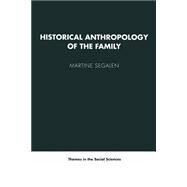Historical Anthropology of the Family
, by Martine Segalen , Translated by J. C. Whitehouse , Sarah Matthews- ISBN: 9780521276702 | 0521276705
- Cover: Paperback
- Copyright: 11/28/1986
This historical anthropology of the family represents a new departure in family studies. Over the past ten years or so, the social scientific sociological analysis of the family has undergone a change, and has been obliged to reconsider its traditional view that industrialisation triggered a shift within society from the 'large family', which fulfilled all social functions from socialising the children to caring for the sick and the old, to the modern nuclear family, which was regarded solely as being the locus for emotional relationships. Historians have shown that in the past there was in fact a great variety of different family structures within a wide range of varying demographic, economic and cultural frameworks, distinctive for each society. At the same time, the interaction between sociology and social anthropology has led to a clearer conceptual analysis of that vague, polysemic term 'family'; and notions of dwelling-place, descent, marriage, the relative roles of husband and wife and parent-child relations, as well as the more general relations between generations, have in a variety of past and present social contexts been taken apart and analysed. In this book, Martine Segalen reviews and synthesises a rich wealth of often little-known European and North American historical and social anthropological material on the family. This results in a reversal of the frequently held view of the family as an institution in decline, showing it instead to be both dynamic and resistant.






